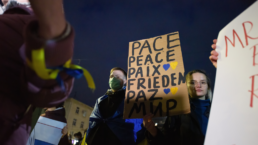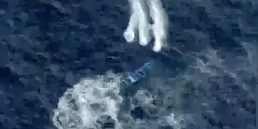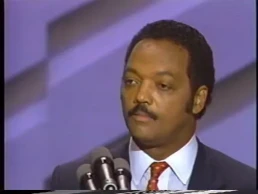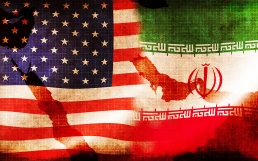Vladimir Putin has launched his invasion of Ukraine, seemingly expecting that his forces can subdue Ukrainian resistance. But the attack could severely destabilize his regime — with Russians already showing a notable lack of enthusiasm for war.
By Ilya Matveev and Ilya Budraitskis, Jacobin
Russia attacked Ukraine last night. The worst fears have been confirmed. The extent of the invasion is not fully understood, but it is already clear that the Russian military has attacked targets all over the country, not just in the South-East (along the border of the so-called “people’s republics”). This morning, Ukrainians in various cities were woken by explosions.
Vladimir Putin has made clear the military objective of the operation: the complete surrender of the Ukrainian army. The political plan remains unclear — but perhaps most likely means the establishment of a pro-Russian government in Kiev. The Russian leadership assumes that resistance will quickly be broken and that most ordinary Ukrainians will dutifully accept the new regime. The social consequences for Russia itself will obviously be severe — already in the morning, even before Western sanctions were announced, Russian stock exchanges collapsed and the fall in the ruble broke all records.

Putin’s speech last night, in which he announced the outbreak of war, represented the unconcealed language of imperialism and colonialism. In this sense, his is the only government that so openly speaks like an imperialist power from the early twentieth century. The Kremlin is no longer able to hide behind other grievances — including even NATO enlargement — its hatred of Ukraine and desire to teach it a punitive “lesson.” These actions are beyond rationally understood “interests” and lie somewhere in the realm of “historical mission,” as Putin understands it.
Since Alexei Navalny’s arrest in January 2021, police and the security services have essentially crushed the organized opposition in Russia. Navalny’s organization was deemed “extremist” and dismantled, demonstrations in his defense resulted in some fifteen thousand arrests, and almost all independent media were either closed down or branded “foreign agents,” severely limiting their operation. Mass demonstrations against the war are unlikely — there is no political force capable of coordinating them and participation in any street protest, including even a single-person picket, is swiftly and severely punished. Activist and intellectual milieus in Russia are shocked and demoralized by the events.
Recent Posts
U.S. Sent a Rescue Plane For Boat Strike Survivors. It Took 45 Hours To Arrive.
February 17, 2026
Take Action Now In seas that could kill a person within an hour, it took nearly two days for a rescue plane to arrive.By Tomi McCluskey and Nick…
“Keep Hope Alive”: Remembering Rev. Jesse Jackson, Civil Rights Icon Who Twice Ran For President
February 17, 2026
Take Action Now “Our father was a servant leader — not only to our family, but to the oppressed, the voiceless, and the overlooked around the…
The Iranian Trap: Neither Military Action Nor Nuclear Negotiations Can Solve Trump’s (and Israel’s) Conundrum
February 16, 2026
Take Action Now After a failed regime-change strategy and an increasingly risky military buildup, the Trump administration turns back to nuclear…
Suffocating an Island: What the U.S. Blockade Is Doing to Cuba
February 16, 2026
Take Action Now Electric motorcycles are Cuba’s response to the fuel crisis.By Medea Benjamin Marta Jiménez, a hairdresser in Cuba’s eastern city…




